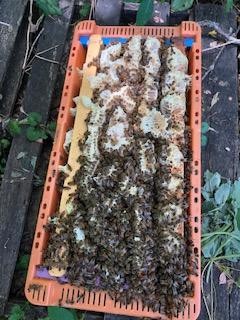Each spring for hundreds of years, beekeepers take advantage of the honeybees' biological urge to expand and grow as winter turns into spring and the bees respond to incoming tree pollen, which allows them to raise new bees and plentiful frames of brood.
These excess bees raised early in the season in warmer climes form the backbone of the supply of bees for hobbyists and small beekeepers in the USA. Package bees and nucs, or nucleus hives, are the typical way beekeepers obtain bees to replace their losses over winter.
In the USA, most of these bees come from California, Texas, and the SE gulf states. These areas are warm enough to allow queen mating early in March and April when it's too cold to do that in the north. An estimated 1.5 million or more colonies of the nations estimated 2.6 million colonies are all in California during February and March for almond pollination.
Package Bees
Package bees are workers shook from hives that would otherwise need to be split. They are sold in 2 or 3 pound screened boxes that includes a can of sugar syrup and a mated queen. The beekeeper dumps the bees into their hive and releases the queen and hopes for the best that she starts to lay. Twenty one days after laying or close to a month, new bees emerge and the colony starts to grow.
The risks for the beekeeper receiving the package bees are several. Bees coming from hives rented for almond pollination in California are a major source of package bees, and may have been exposed to fungicides and other chemicals. The mated queen may not have had a chance to lay very long before she was boxed for shipment. Rainy or cold weather may affect the quality of the queen mating. The time and conditions in shipment while the workers are left feeding off the can of syrup and exposed to heat or cold damp conditions can affect the quality of the package of bees by the time you receive them.
Then of course there is the question of how well the queen is accepted by the bees and starts laying. I have used package bees successfully in my younger days and had good success with them. Stay in touch with your package bee supplier and get them fresh off the truck is my advice. Package bees don't have a long shelf life like a nuc that can sit for days or a week.
Bee Nucs
Bee nucs short for nucleus hives, or nucs, are temporary mating hives, typically made from two frames of brood and bees with a frame of honey and an empty frame with a feeder and fresh queen cell. While the queen hatches out, mates, and begins laying, the little hive is sustained by emerging brood from the two frames. When the nuc is ready to be sold it now has had a laying queen for 4 weeks or more and is ready to be expanded into a full hive body. The question about the quality of the worker bees and the mating and egg laying ability of the queen is already known and can be verified and that is why we recommend beginner beekeepers buy a nuc instead of package bees.
A valid question with nucs is the quality of the brood comb in the nuc and the potential for transferring disease. We annually cull any disfigured or comb with sick looking brood. We rotate 1000's of new brood comb into our hives each spring.
Of course the qu ality of the beekeeping operation you buy bees from will greatly determine the quality of the bees you are buying.
Ames Farm Beekeeping Practices
Here are some of the things we have done to ensure the highest quality bees for sale this spring. We don't rent our bees for pollination in California for almonds or anything in Texas. The bees winter in East Texas pine country at our own property near Mt. Enterprise Texas where the main agricultural crop is hay and it's mostly wooded land free of agricultural sprays and chemicals.
The low levels of mites in our bees now are a result of treating our bees with Formic Acid back in August of using Formic Pro a treatment that also kills mites in the brood. We followed up with a second soft treatment using Oxalic Acid over winter to ensure low mite levels in nucs made up in March..
The 2022-2023 winter season has been warm and elm tree pollen has available to the bees to build up on for a month now.

Since 2009 we have raised our own queens using VSH lines developed by Dr John Harbro and others at the USDA. The breeder lines are maintained by VP Queens and we are using the Pol-line 2.2 for our breeders. They are suitable for a range of climates, and we have gotten some great reports from Texas from happy customers that made a 50-60# crop on their nucs last year—and the bees have wintered well, too.
VSH bees remove brood that contains reproductive mites and also sick brood caused by American Foul Brood and chalkbrood.
We rely on these same bees for our honey and comb honey production. So bee assured that the quality of these bees are critical for our success and you will reap the rewards of our meticulous beekeeping practices too. We have bee nucs for sale for sale and pickup in East Texas or in Minnesota during spring of 2023. We also have hive rentals and beekeeping classes available n Minnesota. See our Bees and Beekeeping Services webpage for more updated information.

